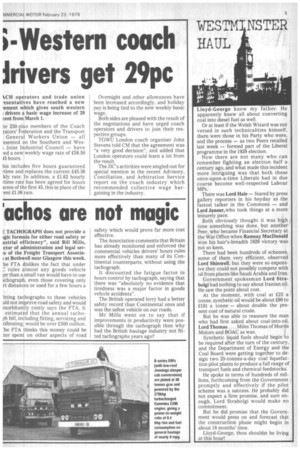'achos are not magic
Page 7

If you've noticed an error in this article please click here to report it so we can fix it.
E TACHOGRAPH does not provide a kgic formula for either road safety or ustrial efficiency", said Bill Mills, !ctor of administration and legal serm of the Freight Transport Associaat Bothwell near Glasgow this week. be FTA dislikes the fact that under – rules almost any goods vehicle ;er than a small van would have to use ichograph, even those covering only rt distances or used for a few hours a 'thing tachographs to these vehicles uld not improve road safety and would exorbitantly costly says the FTA. It estimated that the annual tachoph bill, including fitting, servicing and ilibrating, would be over £300 million. he FTA thinks this money could be ter spent on other aspects of road safety which would prove far more cost effective.
The Association comments that Britain has already monitored and enforced the commercial vehicles drivers' hours rules more effectively than many of its Continental counterparts, without using the tachograph.
It discounted the fatigue factor in hours control by tachograph, saying that there was "absolutely no evidence that tiredness was a major factor in goods vehicle accidents".
The British operated lorry had a better safety record than Continental ones and was the safest vehicle on our roads.
Mr Mills went on to say that if improvements in productivity were possible through the tachograph then why had the British haulage industry not fitted tachographs years ago?




























































































































